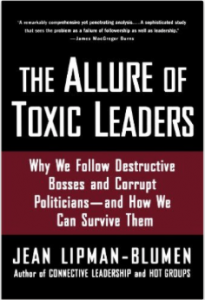He shared in their humanity so that he might free those who were held in slavery by their fear of death. Hebrews 2:14-15
“How does the resurrection of Jesus transform your understanding and practice of leadership?” If someone asked you this question could you answer it clearly?
If this most pivotal event at the core of our faith doesn’t have an impact on how we lead then surely something is wrong. Isn’t it?
Toxic Leaders and the Fear of Death
As I thought about this point, I recalled a fascinating analysis of toxic leadership provided by Jean Lipman-Blumen in her book on toxic leadership. As with other poisonous things, these leaders come in varying degrees of toxicity.

Petty Tyrants. Some are mildly poisonous—one might say “not altogether bad”—and are found in small domains, offices, churches and ministries. They set unreasonable goals, promote excessive internal competiton, and create cultures of blame.
Serious Poisoners. Others rise to the senior ranks of great corporations and lead their companies into disaster. They violate the dignity and rights of others, bend or ignore ethical obligations, and divert resources to elevation of their own grandeur.
Major Monsters. The worst are among the monsters of history who names have become bywords for evil. Their legacy includes death, fear, and devastation. What all toxic leaders have in common is that they “leave their followers worse off then they found them.”
Jesus Teaches About Toxic Leaders
Jesus urged his disciples to consider their own experience.
You know that those who are supposed to rule over the Gentiles lord it over them, and their great men exercise authority over them” (Mark 10:42).
If you study this passage closely you find that the text uses two verbs—”rule” and “exercise authority”—that in most contexts describe perfectly normal and good leadership behaviors. In this passage, however, each these words has the same Greek prefix—”kata”—which among other things means to do something from “above down onto” or “from the side against.”
Here is a perfect description of toxic leaders! They rule “from above” directing commands “down” onto their followers. They gain compliance by using their authority as a club to threaten and push their followers around (Mark 10:42). Adding insult to injury Luke 22:25 tells us that they call themselves “benefactors,” justifying their abusive behavior by saying it was for the good of others.
Why do people follow such leaders?
Why do people follow such leaders? The answers are complex, but Lipman-Blumen puts fear of death at the head of her analysis. “Existential anxiety ticks at the very core of the human condition,” she says, “from the convergence of the known and the unknown: the certainty that death awaits us, welded to the uncertainty of its exact time and circumstances. . . . The infinite possibilities of life, lashed to the finite limitations of inevitable death, induce two profound emotions: exhilaration and desolation.”
Driven by this tension between hope and death humans look for ways to cope. “One powerful way beckons us: leaders who vow to protect us. Leaders offer various reassuring illusions. The most seductive illusion of all promises escape from death, either physically or symbolically, but only if we follow these leaders.” The result is that far too often people cling to toxic leaders who make them feel safe even though their destructive behaviors provide ample reason to abandon them. “If gods or human leaders — and we see how difficult it can be to distinguish between them — promise us safety, we are only too quick to accept. We rarely consider the price we may eventually have to pay for such insurance.”
In this we see that the words of Hebrews 2:14-15 are more true than we could have imagined. Out of fear of death we become slaves to toxic leaders who leave us worse off than they found us. Can there be any escape?
The Resurrection and the Transformation of Leadership
The resurrection of Jesus changes everything. A firm faith in his resurrection can free us from the fear of death and the otherwise irresistable human drive to rely on even toxic leaders for comfort and reassurance. Resurrection-based living is a bold lifestyle that reframes death, transforming it from the core issue of human life to the entrance into a still greater reality with standards that supersede all human rationalizations.
It was resurrection-inspired boldness that turned the original apostles from a small and despondent band hiding in a locked room into bold witnesses who faced the highest authorities with courage and unshakable conviction. Down through the ages of Christian history the principle has been proven true ever and again. Faith in the resurrection of Jesus releases people from the compulsion to seek the illusory safety offered by toxic leaders.
Those who are inspired by the vision of the resurrection of Jesus find courage to lead boldly and to do what is right even in the face of mortal threat. They gain the courage to confront petty tyrants, to resist serious toxic bullies, and to oppose, sometimes at peril of life, the dictators and monsters.
